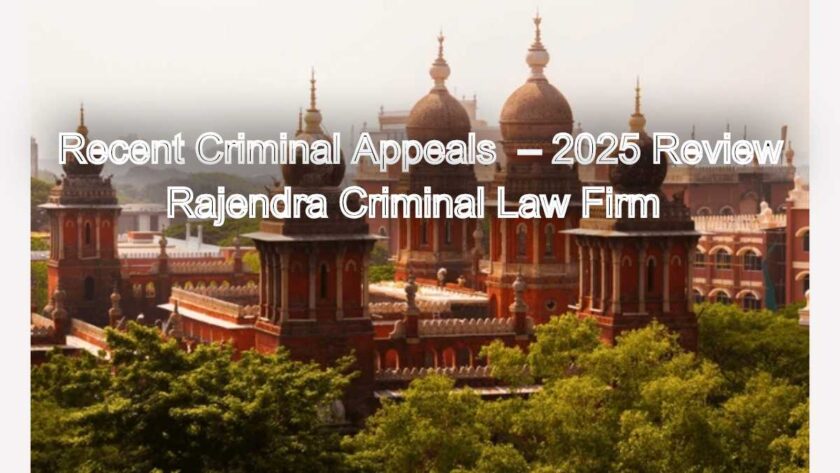Recent Criminal Appeals – Welcome to a review of the latest developments at the Madras High Court. My name is Rajendra, and I’m a partner at Rajendra Criminal Law Firm. Consequently, we are constantly tracking legal precedents. It is true, therefore, that this article examines some recent criminal appeals. The Madras High Court has, in fact, been active in its appellate jurisdiction this year. So, we will explore significant judgments from 2025. These rulings offer crucial insights for practitioners and clients alike.
Recent Criminal Appeals Allowed by the Madras High Court – 2025 Review: Rajendra Criminal Law Firm
The Role of Appellate Jurisdiction
First of all, a criminal appeal is a vital part of our justice system. Furthermore, an accused person can challenge a conviction or sentence. This appeal goes to a higher court. The Madras High Court reviews the lower court’s judgment. Subsequently, it checks for errors of law or fact. The court may then confirm, reverse, or modify the trial court’s decision. This process is key to ensuring a fair trial. The principle of “innocent until proven guilty” is at stake.
Appeal Against Acquittal in NI Act Cases
Recently, the court has dealt with many appeals against acquittal. For instance, in a notable case, S. Velusamy vs. D. Sangeetha, the court upheld the acquittal. The case involved Section 138 of the Negotiable Instruments Act. The appellant had lent a large sum of money. He alleged the cheque was for a legally enforceable debt. The respondent, however, said the cheque was only for security. The trial court had acquitted the accused. The Madras High Court scrutinized the evidence. It noted the contradiction in the appellant’s testimony. The appellant stated that he was not a director of a certain company. Later, he admitted he was. The court also found that the respondent had rebutted the statutory presumption. She showed proof of loan repayment. This ruling proves that the burden of proof can shift. Thus, the court dismissed the appeal. It found no fault with the trial court’s order.
Similarly, in C. Basker vs. Krishnaveni, the court dismissed another appeal. Here, the appellant claimed he lent a significant amount. He did not provide any documentation. The trial court had acquitted the respondent. The high court confirmed this. It found the claim highly improbable. The appellant also denied receiving payments. Bank statements, on the contrary, showed he had. This case shows how appellate courts uphold acquittals. They interfere only when there is a clear error. They also respect the findings of the trial court.
Suo Motu Initiative for Minor Cases
In 2025, the Madras High Court has shown its commitment. It is, in fact, addressing the huge backlog of minor cases. Therefore, it has initiated a suo motu criminal writ petition. **
** This means the court started the action on its own. The goal is to speed up justice. It helps clear cases pending for over three years. These cases have a maximum sentence of three years. A dedicated bench has been set up for this purpose. The court may settle compoundable cases through negotiation. For other cases, it might explore compromise. In some instances, it may even permit the withdrawal of prosecution. This action is a major step. It respects the right to a speedy trial. It helps declog the justice system. The court seeks to focus its resources on more serious offenses.
Cross-Examination Rights and Procedural Justice
The right to cross-examine a witness is fundamental. It is part of the principles of natural justice. A case named Panchatsaram vs. The State of Tamil Nadu is relevant here. The Supreme Court addressed a procedural issue. The Madras High Court had dismissed a criminal original petition. The accused wanted to recall witnesses for cross-examination. He had failed to do so earlier. The trial court allowed it but with conditions. The accused did not meet the conditions. Consequently, the evidence was closed. The Supreme Court intervened. It said the interest of justice must prevail. Allowed the appeal. It gave the accused one last chance. This decision highlights a crucial point. Procedural lapses should not override substantive justice. The court’s primary duty is to ensure a fair trial.
FAQs: Recent Criminal Appeals Allowed by the Madras High Court – 2025 Review
A criminal appeal allows a person convicted of a crime to challenge the lower court’s decision in a higher court, like the Madras High Court. It’s crucial because it ensures fairness and that a judgment is legally and factually sound. It upholds the principle that everyone has the right to a fair trial and the opportunity to correct errors.
The court was very cautious. For instance, in cases under the Negotiable Instruments Act (NI Act), the court often upheld the trial court’s acquittal. It did this by scrutinizing evidence and ensuring the accused had successfully rebutted the statutory presumption. The court only interferes when there is a clear and obvious error in the trial court’s judgment.
The court launched a suo motu (on its own motion) initiative to address minor, long-pending cases. The goal is to clear the backlog and speed up the justice delivery process. This action is a big step towards upholding the right to a speedy trial and allows the court to focus on more serious offenses.
Yes, as seen in a key 2025 case, the Supreme Court ruled that procedural lapses shouldn’t override substantive justice. It allowed an accused person to recall witnesses. This emphasizes that the right to cross-examination is fundamental to a fair trial, and courts are willing to provide a last chance to ensure justice is served.
The key takeaway is that the Madras High Court is progressive and proactive. Its judgments in 2025 highlight a commitment to upholding principles of natural justice, ensuring fair trials, and actively working to make the justice system more efficient. These rulings set important legal precedents for criminal law in India.
Conclusion
The Madras High Court has been proactive in 2025. It has reviewed a variety of criminal appeals. The judgments underscore several principles. Firstly, appellate courts are cautious in interfering with acquittals. On the other hand, they will intervene to protect procedural rights. This is especially true for the right to a fair trial. The court’s suo motu action is commendable. It demonstrates a commitment to efficient justice delivery. Therefore, these recent judgments are not just legal precedents. They are indicators of a progressive judiciary. For anyone facing a criminal case, these developments are promising. They show that legal expertise can make a real difference. At Rajendra Criminal Law Firm, we stay updated on these rulings. This ensures our clients receive the best possible defense. We use this knowledge to craft effective legal strategies. Our goal is always to achieve justice.
Read More
- Anticipatory Bail in Tamil Nadu: Strategies That Work in Madras High Court
- How to Quash a False FIR Under Section 482 CrPC in Madras High Court
- Supreme Court Stays: When and How to Get One for Ongoing Cases
- Can You Approach the Supreme Court Directly for Fundamental Rights Violation?
- Landmark Judgments of Supreme Court in Criminal Law (2024–2025)
- Madras High Court Official Website:





